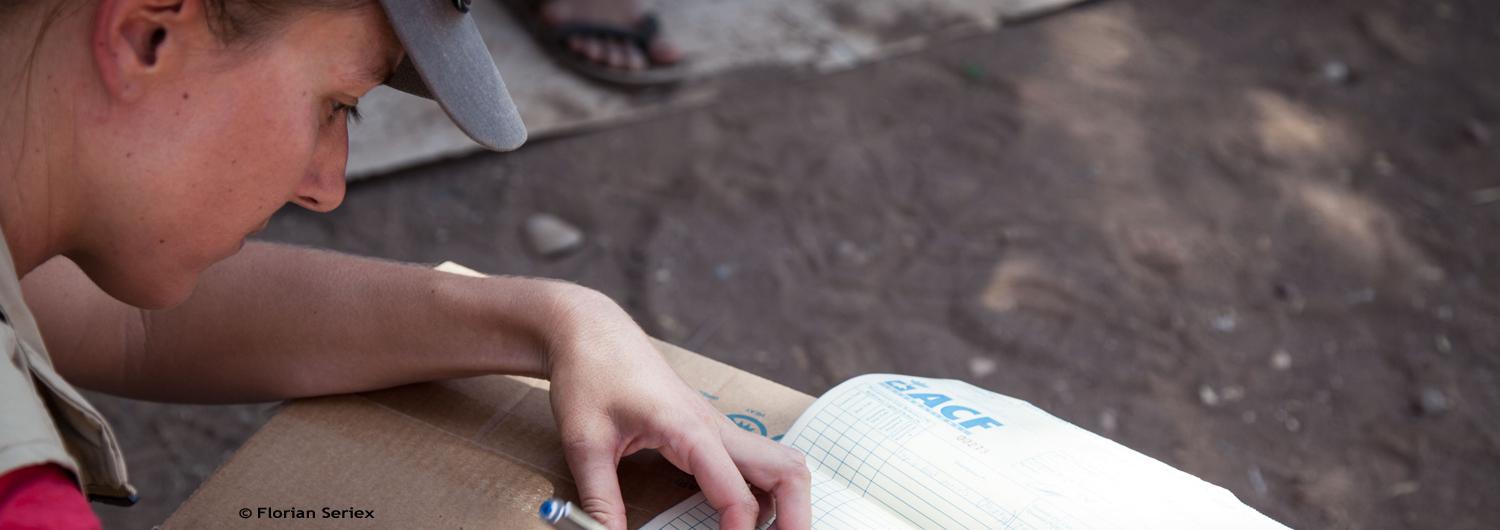Stories
Portrait of an aid worker

Two trucks are parked on waste ground amid a huge cloud of dust. On board the vehicles is several tonnes of food aid destined for the thousands of people who have fled fighting in northern Iraq.
Hélène Schmidt is responsible for the distribution that is due to start soon. She coordinates the teams, straining to make herself heard over the din of the engines. People flock to the entrance of the distribution point. It is almost 50 degrees Celsius and it’s going to take several hours to ensure every receives an emergency ration.
Hélène arrived in the country in July 2014 to set up a food security programme for Action Against Hunger.
When she first arrived, the young woman was working a few kilometers from Mosul – the second largest city of the country, controlled by the Islamic State. But military offensives saw the situation rapidly change.
"On the ground, the work went well," she recalled. "We had distributed nearly 800 tonnes of food in July, but on 4 August, while I was still in the warehouse, one of the teams called and explained that the local population was fleeing. I told them to leave immediately and join them on the road.
"Village after village, families were cramming what they could into the back of their vehicles and heading towards the Kurdistan region of Iraq."
Within weeks, more than 800,000 people were seeking refuge. The needs were immense and Hélène’s team was expanding rapidly. "We went from a team of 12 to 50 people in less than a month: the situation was dramatic."
The work was difficult. The families that arrived were frightened – many had lost relatives and witnessed atrocities. Few of them spoke English, but one meeting has stayed with Hélène.
"I remember the distress of one elderly man," she said. "His daughter had her baby in her arms when a fighter took the infant, murdered them and threw the child down before her. There are no words to describe such an act. They have seen absolute horror."
In such situations, a listening ear or reassurance can be extremely important and so Action Against Hunger offers psychological support to those families it meets. It’s now an essential part of the organisation’s work.
Until the end of September, the distribution of more than 2,500 tonnes of food to tens of thousands was Hélène’s responibility. "At the end of the mission, I was exhausted," she said. "It was extremely motivating to help these families every day but emotionally and physically, it was testing."
Back to Dohuk
Hélène returned to Saint Orens in France, where she grew up, for a few weeks of rest. In recent years, she has worked in various humanitarian situations, including in Burkina Faso, Chad, Ethiopia and Sierra Leone.
"I was born in St Orens and grew up here. Although I left to study, I like coming back to relax. I went to an engineering school for the food industry and then to the Institut Bioforce, which prepares you for a humanitarian career, particularly in logistics. In fact, I always wanted to work in the humanitarian sector. "
Weeks passed, and after turning down several other work proposals Hélène returned to Iraq. It was winter and the living conditions of those displaced were terrible – only a small proportion of them were in the camps. Hélène organised winter kit distributions, which included jackets, jumpers, socks and boots. Everything was bought locally to minimise costs and contribute to the local economy.
Her project ended in early March but Hélène remains faithful to the mountains of the Kurdistan region of Iraq and to Dohuk, a city of 350,000 inhabitants where Action Against Hunger has a base. "Action Against Hunger launched a new project funded by the Humanitarian Aid and Civil Protection of the European Commission (also known as ECHO)," said Hélène. "The goal is to predict new waves of displacement that could be caused by military offensives. Last year we responded quickly, but thanks to the work we are now doing, the help we can provide is appropriate and immediate."
Increasing understanding of our work
Every day, meetings are increasing with local parties in areas near the front line in order to help ensure we can cross military checkpoints and that we know the relevant authorities in the area’s many villages. Among the ongoing concerns : will the local market be able to meet the needs of tens of thousands of people ? And can we ensure food distributions to those who need them?
Action against Hunger favours solutions that enhance the local economy and safeguard the population’s independence. The distribution of food coupons, for example, allows families to purchase the products they want while also boosting the local economy. We monitor water points, train of social workers, evaluate the supply capacity.
Hélène said: "It's a complicated job, overnight you can suddenly find yourself denied access to an area due to military operations. Or maybe another time we will need additional documentation. But the authorities understand the merits of our work, which makes the relationship easier and if there is a mass displacement of people, we are ready to help."
It’s been more than a year since Hélène Schmidt arrived in Iraq and the challenges remain enormous: "All humanitarian agencies will need to multiply efforts to improve the situation."
JOIN US
Donate now
Your donation will reach those who most need it
Become a member
Join the generation that can bring an end to hunger
Donate via SMS
send HAMBRE to:
- 28010(1.2€)
- 38010(6€)
- 38012(3€)
Full donation to our projects. Valid for Movistar, Vodafone, Orange and Yoigo